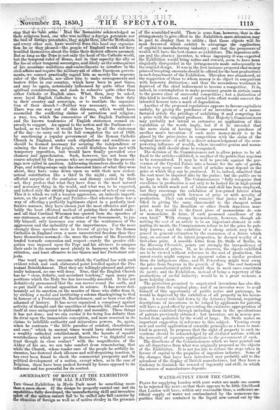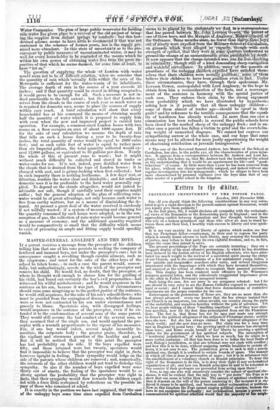WATER-SUPPLY FROM THE CLOUDS.
Pram for supplying London with pure water are made one season to be rejected the next ; so that there appears 'to be little likelihood that London will have, within eny reasonable time, -a sufficient ar- tificial supply of water not .contaminated by the numerous im- purities that 'are contained in the liquid now -served out by the
Water Companies. The plan of large public reservoirs. for Wai& rain-water has given place to a revivirk of the oldprojectaf hringo jug:the supplies from distant, springtii by conduitli lit# this last: devised scheme seems tolavo little lo recOMM44Ztkit 'Was not contained in the schemes of former yearso:A M ,1141.PlAY Pro- mised more abundant. . In this state of uneertaintyKes to the pro- Cerement by public measineri'cif tincontantinated,watlity: it may be well for every householdOr to be reminded of the ['Meats which lie within his own power of obtaining water free, fib* the gross im- purities, of that which he seems doomed, for somplripie at least, to have." let on."
The question of supplying the whole of London with water weifid seem not to be of difficult solution, when' vie consider that the quantity. of rain which•actually falls within the area of the Metropolis is sufficient for the water-wants of its inhabitants. The average depth of rain in the course of a year exceeds 23 inches,. and if that quantity could be stored in fitting receptacles, it would prove to be enough for all. Such a measure is not in- deed practicable to the full extent ; but the fact that London re- ceives from the clouds in the course of each year as much water as is required for domestic uses, seems to place the sources of supply within easy reach. A brief calculation will show that every householder has at his command the means of obtaining nearly half the quantity of water which it is proposed to supply him with even when the new and improved project is earned into operation. For example, a common-sized London house with two rooms on a floor occupies an area of about 1000 square feet. If for the sake of easy calculation we assume the depth of rain that falls on such a house during a year to be twenty-four inches, the total quantity of water would be equal to 2000 cubic feet; and as each cubic foot of water is equal to rather more than six Imperial gallons, the total quantity collected would ex- ceed 12,000 gallons, or equivalent to 33 gallons per diem. Nearly the whole of this at present runs to waste ; but it might without much difficulty be collected and stored in tanks or
i water-casks for use. It is not, indeed, pure distilled water from the clouds that is drained from the tops of London houses : it is charged with soot, and is grimy-looking when first collected ; but in such impurity there is nothing loathsome. A few days' rest, or filtration, renders the water clear and drinkable; and for ordinary domestic uses it is far preferable to the hard water generally sup- plied. To depend on the clouds altogether, would not indeed be advisable nor safe, though if carefully used their supplies might suffice ; but the general adoption of the plan of collecting rain- water would be of great advantage, not only because such water is free from earthy matters, but as a means of diminishing the de- mand. At present a great deal of the water received is carelessly if not wilfully wasted : if a system of measuring and charging for the quantity consumed by each house were adopted, as in the con- sumption of gas, the collection of rain-water would become general as a measure of economy, and the additional quantity required would be comparatively so small that the difficulty which seems to exist of procuring an ample and fitting supply would speedily vanish



























 Previous page
Previous page